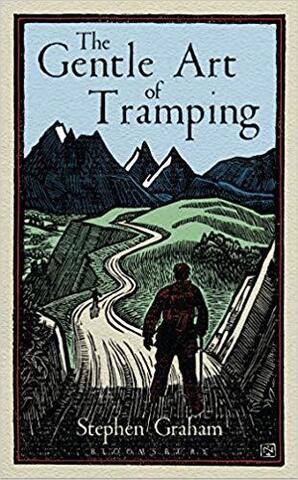
The Gentle Art of Tramping
By Stephen Graham. Originally published by Robert Holden & Co., Ltd., 1927, 264 pp. (with a dozen blank pages for "Notes by the Wayside"). Re-issued in 2019 by Bloomsbury Reader, foreword by Alastair Humphreys. Available on Kindle.
First published in 1927 and recently re-issued, The Gentle Art of Tramping, by the British travel writer Stephen Graham (1884-1975) is a terrific and timeless guide, at once practical and spiritual, to tramping.
And what, you might well ask, is "tramping"? In his foreword to the new edition, Alastair Humphreys suggests a better word for the modern reader might be "hiking," or "backpacking." This is true—but for Graham, the activity connotes far more than these neutral words imply.
To tramp, says Graham, is "to liberate yourself from the tacit assumption of your everyday life." For those who tramp—which includes "all true Bohemians, pilgrims, explorers afoot, walking tourists, and the like"— "there is much to learn, there are illusions to be overcome, …prejudices and habits to be shaken off." Indeed, "Know how to tramp," says the author, "and you know how to live."
Graham's meditative guide is filled with pithy, colorful, and witty advice. On the practical side, he offers chapters on boots, knapsacks, clothes, carrying money (Don't. "The less you carry the more you will see, the less you spend the more you will experience), companions ("You discover to one another all the egoisms and selfishnesses you possess"), the fire ("Do not forget the matches!") and the crucial coffee pot ("Coffee should be made with love; that's the first ingredient.")
But as these pragmatic suggestions make clear, Graham's is a philosophical approach to being outdoors. He sees it not only as a way to free oneself from one's everyday identity ("What a relief to escape from being voter, tax-payer, authority on old brass…"), but also as a path of learning: "No number of museums or handbooks or columns of statistics can give you the sum of reality obtained, quite simply and without particular effort, upon the road."
As you can see, I have no end of quotes from this book, which—non-walker though I may be— I enjoyed immensely.